英语学术论文写作技巧academic writing skills(全英文版)
一些英文文章写作技巧
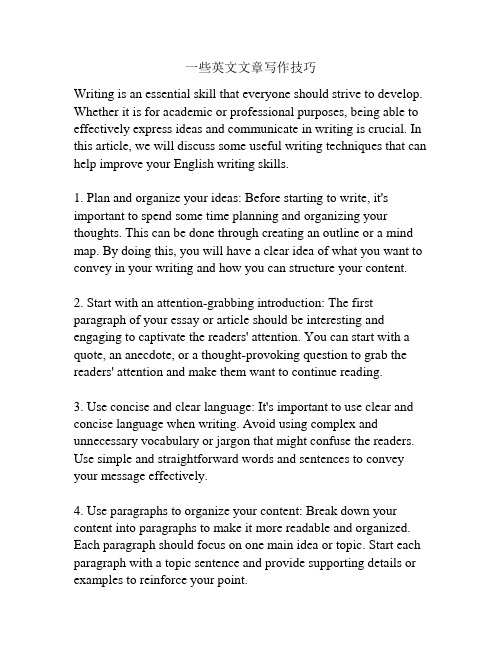
一些英文文章写作技巧Writing is an essential skill that everyone should strive to develop. Whether it is for academic or professional purposes, being able to effectively express ideas and communicate in writing is crucial. In this article, we will discuss some useful writing techniques that can help improve your English writing skills.1. Plan and organize your ideas: Before starting to write, it's important to spend some time planning and organizing your thoughts. This can be done through creating an outline or a mind map. By doing this, you will have a clear idea of what you want to convey in your writing and how you can structure your content.2. Start with an attention-grabbing introduction: The first paragraph of your essay or article should be interesting and engaging to captivate the readers' attention. You can start with a quote, an anecdote, or a thought-provoking question to grab the readers' attention and make them want to continue reading.3. Use concise and clear language: It's important to use clear and concise language when writing. Avoid using complex and unnecessary vocabulary or jargon that might confuse the readers. Use simple and straightforward words and sentences to convey your message effectively.4. Use paragraphs to organize your content: Break down your content into paragraphs to make it more readable and organized. Each paragraph should focus on one main idea or topic. Start each paragraph with a topic sentence and provide supporting details or examples to reinforce your point.5. Use transitional words and phrases: Transitional words and phrases help to create coherence and flow in your writing. Examples of transitional words and phrases include "however," "on the other hand," "in addition," "furthermore," and "consequently." These words and phrases help to connect ideas and make the writing more coherent.6. Use evidence and examples to support your points: When making an argument or expressing an opinion in your writing, it's important to back it up with evidence and examples. This helps to make your writing more convincing and credible. Use statistics, facts, or personal anecdotes to support your claims and strengthen your arguments.7. Revise and edit your writing: After completing your first draft, take some time to revise and edit your writing. Look for grammar and spelling errors, awkward sentence structures, and unclear or ambiguous phrases. It is also helpful to read your writing aloud to identify any areas that may need improvement. Remember, writing is a process, and it is through revision and editing that you refine your work and make it better.8. Read extensively: Reading extensively can greatly improve your writing skills. By reading different genres and styles of writing, you expose yourself to different writing techniques and styles. This helps you to expand your vocabulary, improve your grammar, and develop your own unique writing voice.9. Seek feedback: When possible, seek feedback from others onyour writing. This can be from teachers, colleagues, or friends. Feedback helps you to identify areas of improvement and provides valuable insights on how to refine your writing.10. Practice regularly: Like any skill, writing requires practice. Regularly writing and engaging in writing exercises can help you improve your writing skills over time. Set aside time each day or week to write, whether it is journaling, writing short stories or essays, or even blogging. The more you practice, the better you will become.In conclusion, writing is an important skill that can be developed and improved with practice and patience. By following these writing techniques, you can enhance your English writing skills and effectively convey your ideas and thoughts through your writing. Remember, writing is a lifelong journey, and with dedication and perseverance, you can become a proficient and confident writer.继续写相关内容,1500字11. Understand the purpose and audience: Before writing, it's crucial to understand the purpose of your writing and who your target audience is. Are you writing an academic paper, a professional email, or a blog post? Knowing your purpose helps you stay focused and tailor your writing to meet the specific needs of your audience. For example, an academic paper will require a more formal tone and cite credible sources, while a blog post may be more conversational and engaging.12. Develop strong thesis statements: In academic writing, a thesis statement is a concise and clear statement that presents the mainargument or point of your essay. It acts as a roadmap for your readers and helps them understand the main focus of your writing. Make sure your thesis statement is specific and arguable, and provide evidence or examples throughout your writing to support your thesis.13. Master the art of storytelling: Storytelling is a powerful tool in writing that captivates readers' attention and makes your content more relatable. Use anecdotes, personal experiences, or fictional narratives to convey your messages or illustrate complex ideas. This helps create an emotional connection with your readers and makes your writing more memorable.14. Use varied sentence structures and lengths: Monotonous writing can make your content dull and uninspiring. To engage your readers, vary your sentence structures and lengths. Use a mix of simple, compound, and complex sentences to add rhythm and interest to your writing. Short sentences can be impactful and concise, while longer sentences can be used for detailed explanations or descriptions.15. Practice active voice and avoid passive voice: The active voice adds clarity and strength to your writing, making it more direct and engaging. Active voice focuses on the subject performing the action, while passive voice emphasizes the receiver of the action. For example, "The dog chased the ball" (active voice) is more dynamic than "The ball was chased by the dog" (passive voice). Active voice is preferred in most writing situations, as it conveys a sense of ownership and responsibility.16. Use visuals and multimedia elements: To make your writing more visually appealing and engaging, consider incorporating visuals and multimedia elements. Images, charts, graphs, or videos can help illustrate your points or provide additional context. However, make sure the visuals you choose are relevant and enhance your writing, rather than distracting from it.17. Pay attention to grammar and punctuation: Accurate grammar and punctuation are essential in effective writing. They ensure clarity and coherence, and prevent misunderstandings. Use grammar checkers and proofreading tools to identify errors, but also develop an understanding of grammar rules and punctuation. Practice using commas, semicolons, colons, and other punctuation marks to enhance the structure and flow of your sentences.18. Balance creativity with clarity: While it's important to be creative and innovative in your writing, don't sacrifice clarity for the sake of being unique. Your writing should be understandable and accessible to your readers. Avoid overly complex sentence structures or excessive use of figurative language that may confuse your audience. Strive for a balance between creativity and clarity to effectively convey your ideas.19. Be concise and avoid unnecessary repetition: Good writing is concise and to the point. Avoid unnecessary repetition and wordiness that may dilute the impact of your writing. Cut out filler words or phrases and ensure that each word contributes meaningfully to your message. Use strong verbs and precise language to convey your ideas succinctly.20. Embrace continuous learning: Writing is a lifelong learning process. Stay curious and embrace continuous learning to improve your writing skills. Read books, attend writing workshops, or take online courses to enhance your understanding of grammar, vocabulary, and writing techniques. Seek feedback from professionals in the field, and never stop seeking opportunities to refine your writing.In conclusion, developing strong writing skills is essential for effective communication in various aspects of life. By planning and organizing your ideas, writing concisely and clearly, using transitional words, providing evidence and examples, revising and editing your work, and engaging in regular practice, you can enhance your English writing abilities. Additionally, understanding your purpose and audience, storytelling, using varied sentence structures, applying active voice, incorporating visuals, maintaining grammar and punctuation accuracy, balancing creativity with clarity, being concise, and continuously learning can help take your writing to the next level. As with any skill, improvement comes with practice and dedication, and by following these techniques and committing to your growth as a writer, you can become a proficient and confident communicator in writing.。
英语满分作文技巧
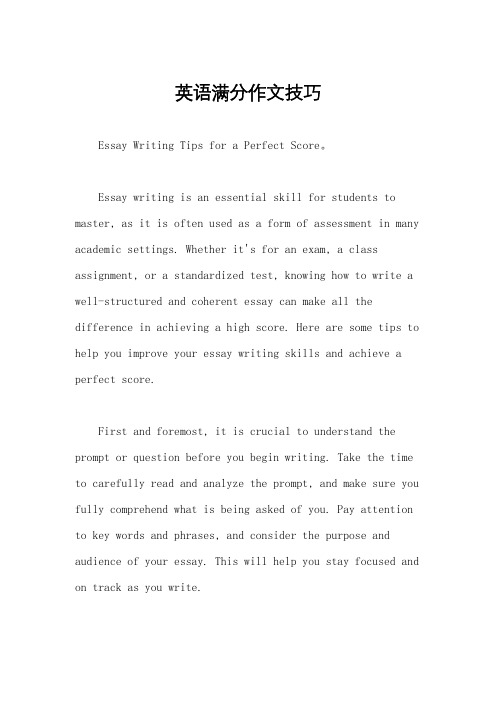
英语满分作文技巧Essay Writing Tips for a Perfect Score。
Essay writing is an essential skill for students to master, as it is often used as a form of assessment in many academic settings. Whether it's for an exam, a class assignment, or a standardized test, knowing how to write a well-structured and coherent essay can make all the difference in achieving a high score. Here are some tips to help you improve your essay writing skills and achieve a perfect score.First and foremost, it is crucial to understand the prompt or question before you begin writing. Take the time to carefully read and analyze the prompt, and make sure you fully comprehend what is being asked of you. Pay attention to key words and phrases, and consider the purpose and audience of your essay. This will help you stay focused and on track as you write.Once you have a clear understanding of the prompt, it's important to brainstorm and plan your essay. Organize your thoughts and ideas, and create an outline to guide your writing. Consider the main points you want to make, and think about how you will support them with evidence and examples. A well-structured outline will help you stay organized and ensure that your essay flows logically from start to finish.When it comes to actually writing the essay, it's important to pay attention to your language and tone. Use clear and concise language, and avoid using overly complex or convoluted sentences. Be mindful of your tone, andstrive to maintain a formal and academic style throughout your essay. Additionally, be sure to use proper grammar, punctuation, and spelling to convey your ideas effectively.Another key aspect of essay writing is the use of evidence and examples to support your arguments. When making a point, be sure to back it up with relevant evidence and examples. This could include data, statistics, quotes from experts, or real-life examples. Providingstrong evidence will make your arguments more persuasive and help you build a convincing case for your position.In addition to using evidence, it's important to consider counterarguments and address them in your essay. Acknowledging and refuting opposing viewpoints demonstrates critical thinking and strengthens your own argument. It also shows that you have considered multiple perspectives on the issue at hand, which can impress your readers and earn you extra points.Finally, don't forget to revise and edit your essay before submitting it. Take the time to review your work, checking for any errors or inconsistencies. Look for opportunities to improve your language and structure, and make sure that your essay is well-organized and coherent. Consider seeking feedback from a teacher, tutor, or classmate to get a fresh perspective on your writing.In conclusion, essay writing is a skill that can be developed and refined with practice. By understanding the prompt, planning your essay, using clear and persuasivelanguage, providing evidence, addressing counterarguments, and revising your work, you can improve your essay writing skills and achieve a perfect score. Keep these tips in mind as you continue to practice and refine your writing, and you will be well on your way to becoming a proficient and effective essay writer.。
Academic Writing Skill
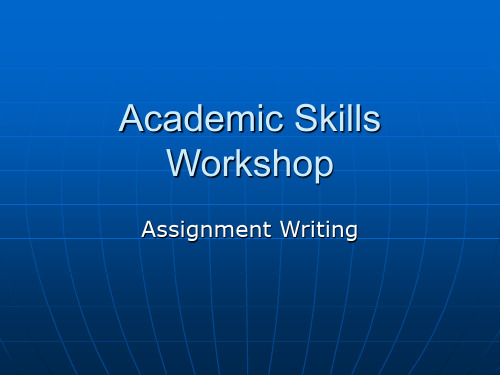
Preparation
Take down basic points from as many sources as you can manage and compare what the authors are saying as you are reading. There will be both similarities and differences in their views and it helps if you can begin to classify authors together.
Writing Style
Argument - an argument is a main idea backed up with evidence and support the idea
You need to challenge the idea , either defend it , refute it or offer some new idea of your own.
Introduction
Set the context of the essay Include a few opening sentences that
announce the title, and briefly explain the topic of the text. Present the aim of the text and summarize the main finding or key argument. Conclude the introduction with a brief statement of your evaluation of the text. This can be a positive or negative evaluation or, as is usually the case, a mixed response.
如何提高学术能力英语作文

如何提高学术能力英语作文English Answer:Enhancing Academic Proficiency in English Composition.Academic proficiency in English composition is acrucial skill that empowers students to effectively express their ideas, engage in critical thinking, and succeed in their studies. To cultivate this ability, severalstrategies can be employed:1. Immerse Yourself in Language:Engage with English texts regularly through reading, listening, and speaking. Exposure to diverse sources, such as literature, articles, and podcasts, broadens vocabulary, enhances comprehension skills, and improves fluency.2. Practice Regular Writing:Regular writing exercises are essential for developing proficiency. Engage in freewriting, structured essays, and timed writing to enhance your ability to organize ideas, construct coherent arguments, and adhere to grammatical conventions.3. Seek Feedback and Revise:Obtain feedback from teachers, peers, or writing centers to identify areas of improvement. Use this feedback to revise and polish your writing, refining your ideas, addressing errors, and enhancing clarity.4. Study Grammar and Vocabulary:A solid understanding of grammar and vocabulary forms the foundation for effective writing. Study grammar rules, practice sentence structures, and expand your vocabulary through word lists and flashcards. This will enable you to use language accurately and expressively.5. Utilize Technology:Leverage technology to enhance your learning. Utilize writing software with grammar and spell-check features, engage in online discussion forums to practice communication, and explore language learning apps to reinforce vocabulary and grammar.6. Seek Inspiration:Read exceptional works of literature and essays to inspire your writing. Analyze their structure, style, and use of language to glean insights and elevate your own writing.7. Set Realistic Goals:Break down your improvement journey into achievable goals. Set daily or weekly writing targets, focus on specific aspects of your writing, and track your progress to stay motivated.8. Find a Study Buddy:Collaborate with a peer or classmate to engage inwriting exercises, exchange feedback, and provide support. This can foster a positive and motivating learning environment.9. Leverage Opportunities:Participate in writing workshops, join writing clubs,or enroll in online writing courses. These opportunities provide structured learning environments and access to expert guidance.10. Maintain Patience and Dedication:Improving academic proficiency in English compositionis an ongoing process that requires patience and dedication. Embrace challenges as opportunities for growth and stay committed to your goal of becoming an effective communicator.中文回答:提高英语写作学术能力。
Essay Writing Skills 英文论文写作技能
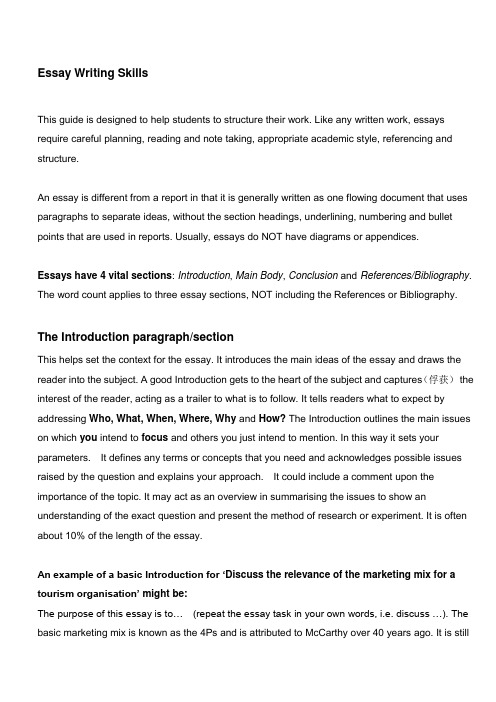
Essay Writing SkillsThis guide is designed to help students to structure their work. Like any written work, essays require careful planning, reading and note taking, appropriate academic style, referencing and structure.An essay is different from a report in that it is generally written as one flowing document that uses paragraphs to separate ideas, without the section headings, underlining, numbering and bullet points that are used in reports. Usually, essays do NOT have diagrams or appendices.Essays have 4 vital sections: Introduction, Main Body, Conclusion and References/Bibliography. The word count applies to three essay sections, NOT including the References or Bibliography.The Introduction paragraph/sectionThis helps set the context for the essay. It introduces the main ideas of the essay and draws the reader into the subject. A good Introduction gets to the heart of the subject and captures(俘获)the interest of the reader, acting as a trailer to what is to follow. It tells readers what to expect by addressing Who, What, When, Where, Why and How? The Introduction outlines the main issues on which you intend to focus and others you just intend to mention. In this way it sets your parameters. It defines any terms or concepts that you need and acknowledges possible issues raised by the question and explains your approach. It could include a comment upon the importance of the topic. It may act as an overview in summarising the issues to show an understanding of the exact question and present the method of research or experiment. It is often about 10% of the length of the essay.An example of a basic Introduction for ‘Discuss the relevance of the marketing mix for a tourism organisation’ might be:The purpose of this essay is to… (repeat the essay task in your own words, i.e. discuss …). The basic marketing mix is known as the 4Ps and is attributed to McCarthy over 40 years ago. It is stilluseful and quoted today. This essay will use examples from P&O Cruises to discuss the relevance of the 4Ps – i.e. product, place, promotion and price. Because a tourism organisation offers an intangible service, the 4Ps apply in a different way to many products.A good Introduction might be:McCarthy’s 4Ps model of the marketing mix (1960) appears to have global recognition and is widely used. However, since the 1980s other academics such as Booms and Bitner (1981) have developed his theory and extended the marketing mix in order for it to apply more effectively to tourism by including other elements such as ‘People’ (as tourism is an intangible, non-standard, perishable product reliant on people delivering the service). This essay will define and discuss various marketing mix models and consider various views for either keeping a simple 4Ps or extending to 5Ps, 7Ps or more, and consider whether all aspects are equally relevant. The relevance of these marketing mixes will be applied to a tourist board, as this faces special challenges.The main body is the place for your evidence!The main section of the work should be organised into paragraphs which present the facts and develop the arguments. The structure will depend upon what you are asked to do, e.g. compare and contrast, analyse, critically evaluate, explain, etc..Address the exact task and focus of the question set. It is this difference that gives work better grades. Never write all you know about a topic!Decide on your main points. Organise these points in appropriate paragraphs to build your work in a series of logical steps to suit the essay’s length, complexity and purpose. P aragraphs group related sentences to develop each main idea, making it easier to follow your points. In each paragraph include PEEEL–P oint, E vidence, E xample, E xplain, L ink.Paragraphs need a key P oint which is often the first sentence. Define your point, clearly and concisely. Then include supporting E vidence, quote definitions, refer to facts, and other people’s theories that relate to the same point. Apply relevant E xamples to clarify. E xplain the relevance to the main point in following sentences. Often paragraphs have four to eight sentences that show your evidence and comments upon it. Make sure paragraphs L ink with preceding or subsequent content and use signposts and linking expressions frequently. Remember to keep linking to the essay title. The final sentence of a paragraph acts as link forward to the information of the next paragraph.So paragraphs share characteristics (UCOD). All the sentences in a paragraph have U nity as they should relate to the same point/ topic. Each paragraph should be C oherent, containing sentences in logical order, with linking words helping to make transitions between sentences. The O rder of information should be clear, whether it is chronological or by order of importance. Paragraphs can be D eveloped by using examples, comparison, contrast, statistics, definitions, analysis or a combination of these, depending on the purpose of writing o r the subject matter. Always check that you define (before you develop) important ideas/ concepts used in your work. Avoid long and rambling sentences and paragraphs. Consider the length of each paragraph and if the points could be more clearly expressed and if separate paragraphs are needed.Write as concisely as possible. Remember KISS; K eep I t S hort and S imple to make your meanings clear. Use Academic Style to check Business School requirements, which generally avoid using slang, informality and persona l pronouns like ‘I’or ‘We’or ‘You’.Use signposting words and phrases (e.g. therefore, however, conversely, again) to help readers follow your work. Phrases such as "The underlying reason" may be used to address thecause/effect and show relationships between concepts, etc. "It is disputable whether" may be used in arguments (i.e. giving and evaluating information). "The first factor to consider” may be used to order or process (showing how something is done).When you provide specific detail/s as evidence, follow Harvard Referencing system. Show how each reference used relates to the exact task and supports your points. You are the detective giving all possible evidence to support the case! State your evidence for all assertions. Avoid generalisations (e.g. All authors consider…), assumptions (e.g. People in Britain are British) and rhetorical questions (e.g. Why does this happen?). Choose your quotes carefully, keeping them brief and explaining the importance and relevance of each. You need to use as much evidence as possible! Quotes need to be within quotation marks and clearly state Author (year: page number). Paraphrased references need Author (year). Copy all reference details into the References/ Bibliography immediately, fully and accurately as this is better than compiling the list later.Refer to all your sources in 2 places:∙in the main body of your work in the abbreviated form∙in the last section, in a detailed list of References/Bibliography.Conclusions – Summarising key points in the last section/paragraphsRestate your focus by emphasising the key points, drawing together the threads of your work. A basic conclusion refers back to the main points, linking them to the exact task to prove that you have addressed it exactly. For example, ‘This essay has looked at the issues of… and found…’DO NOT include any new information/evidence because you are ‘summing up’ (as for a jury!). For this reason, you generally do not include any text citations but you may cross reference. Check your Conclusion refers back to the Introduction. Link them in case the reader was not paying attention! Make sure that your ending does not tail off weakly as a conclusion should be strong!This may be the place for you to form a judgement - your own personal conclusion/personal observations. Sometimes this is the place to make recommendations. Lecturers will advise you what they expect. Ask if you are unsure.References/ BibliographyFollow Harvard Referencing for all referencing and quotations. Referencing is the process of recording details of the secondary sources (books, journal articles, electronic sources etc.). Read the Harvard Referencing for examples of how to reference any sort of material. Check your Harvard Referencing is thorough - that you have included all your sources. Cross-reference points where possible to avoid repetition.Remember References at the back of your essay ONLY contain sources that you have referred to in the text. Bibliographies contain all the sources that you used in your research, e ven if you did not quote or refer to them specifically in your text. Your lecturer will advise you which they require.Finally - Hand in on time to avoid penalty!。
英文学术论文写作技巧(写作常用句型)
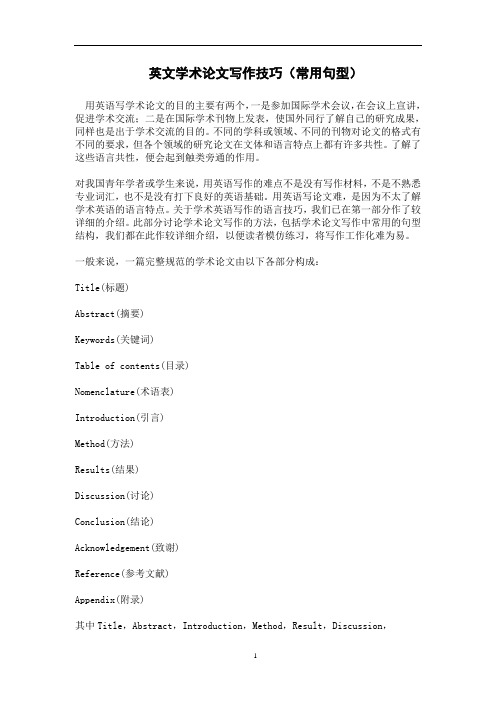
英文学术论文写作技巧(常用句型)用英语写学术论文的目的主要有两个,一是参加国际学术会议,在会议上宣讲,促进学术交流;二是在国际学术刊物上发表,使国外同行了解自己的研究成果,同样也是出于学术交流的目的。
不同的学科或领域、不同的刊物对论文的格式有不同的要求,但各个领域的研究论文在文体和语言特点上都有许多共性。
了解了这些语言共性,便会起到触类旁通的作用。
对我国青年学者或学生来说,用英语写作的难点不是没有写作材料,不是不熟悉专业词汇,也不是没有打下良好的英语基础。
用英语写论文难,是因为不太了解学术英语的语言特点。
关于学术英语写作的语言技巧,我们已在第一部分作了较详细的介绍。
此部分讨论学术论文写作的方法,包括学术论文写作中常用的句型结构,我们都在此作较详细介绍,以便读者模仿练习,将写作工作化难为易。
一般来说,一篇完整规范的学术论文由以下各部分构成:Title(标题)Abstract(摘要)Keywords(关键词)Table of contents(目录)Nomenclature(术语表)Introduction(引言)Method(方法)Results(结果)Discussion(讨论)Conclusion(结论)Acknowledgement(致谢)Reference(参考文献)Appendix(附录)其中Title,Abstract,Introduction,Method,Result,Discussion,Conclusion,Reference等八项内容是必不可少的(其他内容根据具体需要而定)。
在这八项内容中,读者最多的是Title,Abstract和Introduction部分,读者会根据这些内容来决定是否阅读全文。
也就是说,一篇研究论文赢得读者的多少,在很大程度上取决于Title,Abstract和Introduction写得好坏。
因此这三项内容将各分章详细加以讲述。
学术论文的正文一般包括Method,Result,Discussion三个部分。
如何提升写作技能英语作文
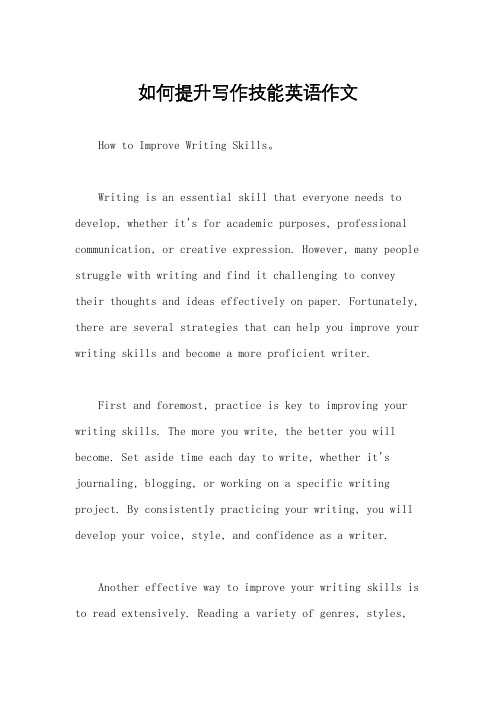
如何提升写作技能英语作文How to Improve Writing Skills。
Writing is an essential skill that everyone needs to develop, whether it's for academic purposes, professional communication, or creative expression. However, many people struggle with writing and find it challenging to convey their thoughts and ideas effectively on paper. Fortunately, there are several strategies that can help you improve your writing skills and become a more proficient writer.First and foremost, practice is key to improving your writing skills. The more you write, the better you will become. Set aside time each day to write, whether it's journaling, blogging, or working on a specific writing project. By consistently practicing your writing, you will develop your voice, style, and confidence as a writer.Another effective way to improve your writing skills is to read extensively. Reading a variety of genres, styles,and authors can expose you to different writing techniques and help you expand your vocabulary. Pay attention to how writers structure their sentences, develop their ideas, and use language to convey meaning. By studying the work of others, you can learn new ways to approach your own writing.In addition to practice and reading, seeking feedback from others can also help you improve your writing skills. Share your writing with friends, family members, teachers,or writing groups and ask for their honest feedback. Constructive criticism can provide valuable insights into your strengths and weaknesses as a writer and help you identify areas for improvement. Be open to feedback and use it as an opportunity to grow and develop your writingskills.Furthermore, learning grammar and punctuation rules can significantly enhance your writing. Understanding the basic principles of grammar and punctuation can help you communicate your ideas clearly and effectively. Take the time to review grammar rules, practice editing your writing, and seek out resources to help you improve your writingmechanics.Lastly, revising and editing your work is essential for improving your writing skills. After you have completed a draft, take the time to revise and refine your writing.Look for ways to strengthen your arguments, clarify your ideas, and enhance the overall structure and organizationof your piece. Editing for grammar, punctuation, andspelling errors is also crucial to producing polished and professional writing.In conclusion, improving your writing skills takes time, effort, and dedication. By practicing regularly, reading widely, seeking feedback, learning grammar rules, and revising your work, you can become a more proficient writer. Remember that writing is a process, and it's okay to make mistakes along the way. Embrace the opportunity to learnand grow as a writer, and you will see improvement in your writing skills over time.。
英文学术写作技巧句式有哪些

英文学术写作技巧句式有哪些在英文学术写作中,虽然正式的学术论文通常需要遵循严格的学术规范和结构,但为了满足您的特定要求,我将以口语化、多样化的方式展示一些常见的学术写作句式,每个段落将保持独立并体现不同的语言特点。
段落一:When discussing the methodology, it's crucial to be precise and clear. For instance, you might say, "To collect data, we used surveys and interviews with industry experts. This allowed us to gain a deeper understanding of the current trends and challenges in the field."段落二:In terms of the literature review, it's important to highlight key findings and put them in context. You could say something like, "Previous studies have shown that this approach has been effective in similar settings. However,there's still a need to explore how it applies in our specific context."段落三:Describing the results of your research can be exciting. Try using a more informal tone, like, "The results were pretty fascinating! We found that the intervention had a significant impact on participant outcomes."段落四:When discussing limitations, it's essential to behonest and.。
把作文写好的诀窍英语

把作文写好的诀窍英语Crafting a well-written essay requires a combination of several key elements. Here are some tips to help you improve your essay writing skills:1. Clear Thesis Statement: Start your essay with a clear thesis statement that presents the main idea or argument of your essay. This statement should be concise and specific, providing a roadmap for your readers tofollow throughout the essay.2. Structured Outline: Before you start writing, createa structured outline that outlines the main points you want to cover in your essay. This will help you organize your thoughts and ensure that your essay flows logically from one point to the next.3. Introduction: Begin your essay with an engaging introduction that grabs the reader's attention and provides context for the topic you will be discussing. You can startwith a compelling anecdote, a surprising fact, or athought-provoking question to draw the reader in.4. Supporting Evidence: Use evidence to support your arguments and claims throughout the essay. This can include facts, statistics, examples, and expert opinions. Make sure to cite your sources properly to lend credibility to your arguments.5. Logical Transitions: Use transition words and phrases to connect your ideas and create smooth transitions between paragraphs and sections. This will help your essay flow more smoothly and make it easier for readers to follow your train of thought.6. Concise and Clear Language: Use clear and concise language to convey your ideas effectively. Avoid using jargon or overly complex language that may confuse your readers. Instead, aim for clarity and precision in your writing.7. Critical Analysis: Don't just summarize theinformation you present; instead, provide critical analysis and interpretation of the material. This demonstrates your ability to think critically and engage with the topic on a deeper level.8. Counterarguments and Rebuttals: Anticipate counterarguments to your thesis and address them in your essay. This shows that you have considered different perspectives and strengthens your overall argument.9. Conclusion: End your essay with a strong conclusion that summarizes the main points of your argument and reinforces your thesis. Avoid introducing new informationin the conclusion; instead, focus on tying together the threads of your argument and leaving the reader with a lasting impression.10. Revision and Proofreading: Finally, don't forget to revise and proofread your essay before submitting it. Check for grammatical errors, spelling mistakes, and typos, and make sure that your essay is well-organized and coherent.By following these tips, you can improve your essay writing skills and craft well-written essays that effectively communicate your ideas and arguments. Remember to practice regularly and seek feedback from peers or instructors to further refine your writing abilities.。
英语学术论文写作技巧academic writing skills(全英文版)共38页文档
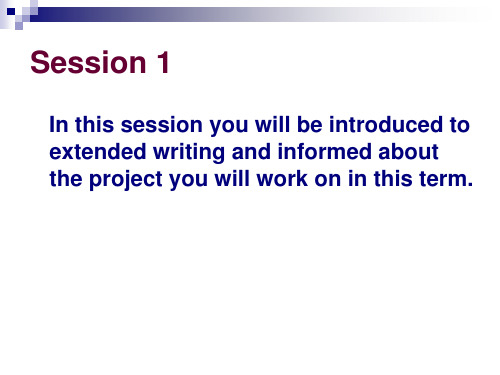
protection/copyright protection” Discuss the following with a partner: Look at the project title above and highlight the key words/phrases. How is the title framed (e.g. statement/question/heading)? What does the title ask you to do?
- gathering information from various sources;
- organizing this information so that it appropriately answers the needs of the task that the writer has to complete;
The reasons why students carry out extended academic writing activities may s their ideas; to provide evidence to support their ideas; to dispute or support existing theories; to display knowledge.
Internet. e) Write down the details of your sources. f) Decide if you need to do more reading. g) Write the contents page, bibliography, title page and abstract. h) Arrange a tutorial with your tutor. i) Do some reading. j) Decide on a topic. k) Write the first complete draft. l) Highlight/take notes of relevant information. m) Plan the contents in detail. n) Work on establishing a clear focus. o) Make a rough outline plan of your ideas. p) Check that sources are available/accessible.
如何掌握学术写作提高你的成绩 How to master Academic Writing 英语作文

如何掌握学术写作来提高你的成绩How to master AcademicWriting to boost up yourgradesHello peeps. Today I am going to tell you how to master academic writing. Academic writing is all about doing the work which you get from college. Your marks are linked with academic assignments. Don’t ignore this aspect of your academic session, even if you find writing an irksome work. Find out a way to develop an interest in writing. You can work with friends or get assignment help from the experts. These arejust some ways through which you can do academic writing with perfection.Almost 40 percent of scores are based on academic writing work. You need to be on your toes all the time to score well in assignments. If you want to score well, you will have to write well. In this article, you are going to get some tips and tricks to write well.Here with you can have an idea of what you will get by the end of this article. So, let’s have a look first:1. What is Academic writing?2. Different types of Academic writing students need to focus on3. Various Academic writing styles4. Things to keep in mind for successful academic writing5.What makes an academic writing work a good oneThis article is based on the above-mentioned points. I can assure that you will gain valuable info here.What is Academic writing?Academic writing is a writing work that students get from their professors. It includes research papers, assignments, thesis, dissertations, essays, etc. The language in academic writing should be formal. It should contain technical jargon as well.For instance, When you write a research paper, avoid casual tone. Focus should be on facts, and ideas rather than people and emotions. Usediscipline related vocabulary and structure. Such as just as humanities requires theory and large paragraphs. Whereas, science subject needs short paragraphs with facts.Want a perfect definition? Here it is:Academic writing is a style of writing adopted by researchers. It’s used for writing an intellectual work of a specific discipline. Academic writing has certain fixed characteristics,such as :Use of formal toneThird person usageUse of noble dictionTechnical terms in coursesRefined languageAll you need for a perfectly written paper is To keep these things in mind. Just remember to write accordingly, and you will see the difference.Stay connected; I have to too many things to tell you. Follow them. There will be nothing which can hamper effective writing from your end.Different types of Academic writing which students need to focus onAssignmentsAssignments are the basic writing work students often get in college. Lecturers give it in order tojudge the performance of the students. These are often on a weekly basis. Students need to write an assignment on a particular topic.Writing assignments can be both interesting and challenging. The process of writing involves multiple processes. Some of them are research, planning, reflection, and organisation. Befriend your assignments they can prove to be enjoyable activities. At the same time, they will develop your thinking skills. If you think you need help in this regard, you can ask your friends and teachers. You can also take online assignment help to get assistance from the experts.EssaysEssays are both long and short. They require creative writing skills and knowledge. Essays are generally written from the writer’s point of view. They are of both types, formal and informal.Essays can be used for different purposes. Some of them are criticism, arguments, informative, etc. Students need to use different theories and researches. An academic essay writing should be from 2000 to 5000 words. You may opt for online essay writing service.DissertationA dissertation is a long form of an essay. It is around 15000 words. It holds immense importance in the life of postgraduate students. Dissertation is the academic writing work.It aimsto show the level of student’s knowledge in a specific subject.If doing it all by yourself is not working well. You may take help from online dissertation writing service. The experts there can give you valuable advice to help with submitting a perfect dissertation.Research PaperA research paper is a kind of academic writing based on student’s original research. The research is done on a particular topic. The paper contains the analysis and interpretation of research findings.Do keep some key points in mind while preparing a research paper. The Introductionmust have a short description of the research paper. Citation work should be correct and original.Five things to focus on while writing an academic paper1. Use of formal toneThe style of the academic paper should be formal and logical. It should have logical and organized ideas. Tone also refers to the manner in which the ideas are conveyed. Present your argument in a pleasant narrative tone. Have an authoritative point of view while writing. Keep the arguments confidently in a research paper with valid proof. Keep in mind that the reader should stay connected while reading.2. Third person usageUsually, a research paper is written from the third person perspective. First and second person narration is valid in storytellings. The author connects himself/herself in a story. But research paper is to convey your argument. For conveying your research, third-person usage is perfect.3. Use of noble dictionIf you are a literature student, then you must be aware of the term noble diction. Literature is about imagination, fantasy and thought process. You must have a good vocabulary to do justice with your work. Your language should express the emotion and feelings. To make it possible you need a language of highest quality.4. Technical terms in courses such as medical, engineering or law.Use technical terms if you are making a research paper on technical or professional courses. But, do not fill it with jargons and do not use them scarcely.5. Refined language with proper grammar and punctuationAvoid grammatical and punctuation mistakes to make your research a successful one. Grammatical errors need to minimal. You can go for online assignment help services. They have software to remove grammatical and punctuation errors.Various Academic writing styles1. DescriptiveDescriptive form of academic writing is the most basic one. It clearly states facts. As the name suggests, it is used to describe the subject. Descriptive information’s primary task is to make an image in a reader’s mind.A good descriptive assignment includes several things:Picturization of feelings of a person or place. Your academic writing work should be a vivid description of emotions.Chronologically correct information. Focus on the spatial information, and emphasize onimportant things first. Information should be organized and in a flow.Facts and evidence supporting your argument. Raise an argument but keep your supporting facts ready.Last but not the least a command over the language. Keep the sentences in active form. There should be a minimal usage of passive form.2. AnalyticalAnalytical academic writing style has its own importance. University level work cannot be completely descriptive. Analytical work is more of analysis and less of descriptive. Your research paper should be categorized to make itanalytical. Analytical academic writing style is used widely. Especially in engineering, business or law students. There work based on data and numerical and less theory.Instructions for analytical writing work are:Analysis of datacomparisoncontrastrelateexamineThings you can try to make your academic writing work analytically:Brainstorming facts and ideas, plan your work. Try different ways to group them. You can make tables of similarity and differences. In your academic writing work, put flow charts, tables, etc. Use as much as possible analytic patterns in every paragraph. This will make the assignment appealing. Start with an introduction, make divisions in your topics. Structuring of writing work will make it clear for the readers.3. PersuasiveThis style of writing is a step ahead from analytical writing. It consists of all the elements of the analytical and descriptive style of writing. In such academic assignment writing work, you give your own point of view. Mostly essays use this style of academic writing. Research articles also have a persuasive style of writing in itsdiscussion and conclusion. Interpretation of findings, arguments, are the elements of persuasive writing. You have to give the evidence in support of the argument you raised. These pieces of evidence can be published works, researches by scholars.How you can master persuasive style of academic writing:Read works of other writers and researchers. Find out whose argument is convincing.Watch out for the strongest evidence they have made.List down the different interpretations.Find out which one is beneficial for you.Develop your argument with the following checklist:List down the reasons for the point of view you made.Search out for the evidence to support your point of view.See how your point of view is different from other scholar’s point of view.Divide your point of you into parts.Work on the presentation of your argument:all your arguments in the paper should support your point of view.Make your reasons clear to the reader.Make valid assumptions.Keep every evidence original. It should be convincing to the readers.4. CriticalCritical academic writing is of vital importance for postgraduates writings. Here you critically analysis someone else works. Often its a criticism and refusal of ideas portrayed in other scholar’s work. In critical writing, you need to create your own argument on the researcher’s interpretation. Critical writing has all the features of persuasive writing and added criticism element. You must need strong evidence to reject the idea of other scholarly work. Examples of critical writing are, literary review, critique of an article.Instructions for critical writing are:CriticismrefusalEvaluating other’s workDebateRemember one thing Critical academic writing needs great skills. You need to understand the topic completely. If you do not possess such skills, go for assignment help online. Assignment help services can make your work easy in no time.Things to keep in mind for successful academic writingPlan before you writePlanning is imperative before doing any sort of work. Be it any academic work, planning is necessary. So before starting any academic assignment, make a proper plan for it. Two main approaches one should follow for organizing and analyzing information.1. The planning approach: As the name suggests, you must plan then write. Do a lot of planning about what you are going to write in paragraphs. Then begin your writing work. You may take advice from online academic writing experts if you feel stuck.2. The drafting approach: Make drafts when ideas and thoughts are blooming in your mind. Write as many drafts as possible. Read them again and organize those ideas. Keep doing it unless they getstructured well. Above mentioned approaches are beneficial in most of the cases. If your subject requires analytic skills, then work on the planning approach. Planning is very essential for creating a masterpiece. It also shows your interest towards the work.Know expectationsBefore starting to write on any subject or topic, know exactly what are the demands. Different subjects have different requirements, know them then work on them. Also, understand the type of work you have to do. Case study, essays, articles, report all these things follow the different organization of data. Ask your lecturers what their demands are. After knowing all these things start working on your academic paper.There are few parameters, check before making academic assignment:Instruction given by the supervisor.Marking schemes, grade allotment. Which part of the assignment is more scoring.Discuss your ideas with your supervisor.What guidelines school or institution is following regarding the format of the assignment.Find samples or model assignments. Usually, academic institutions have model assignments to guide the students.Make a task listTask list helps you to follow a pattern while making an assignment. Write allthe things which you are going to mention in your assignment.Let us have a look at some basic requirements:Make a timeline for the task.How much time you need for specific task. Try to follow it properly.Books and research papers of famous scholars for reference and reading. Create notes from them which will guide you when you will write the assignment.Brainstorming ideas that come to your mind at various points while planning to write. List them so that you won’t forget in future.Format and structure of the assignment. Make a rough structure of your work. How you going to start it, the body of the assignment and appealing ending.Editing and proofreading of work. This task you will perform after making the assignment completely. Proofreading is of utmost importance. This will help you to identify the errors. Correct them and then submit it.What makes an academic writing work a good oneI hope you all want to score good in your academics. You try hard in exams and with assignments to score well. Often some students face difficulty to gain good marks in assignments. You must understand the difference betweennormal writing and good writing. I am mentioning a few points to guide you towards good academic writing.Write clearWhenever you are attempting to write academic assignments, write necessary information. Do not fill your pages with useless data. Your work should contain valuable information. Reader should gain knowledge after reading your content.Teacher and MotivationSimplicityAcademic writing should be in a simple language. Whenever you write the assignmentuse readable language. Jargons and technical terms should be only used for the accuracy. Do not overfill the content with difficult terms.Logical and rationalKeep your work rational and sensible. Use logical assumptions and facts. Try to avoid ambiguous statements or information. Make statements and support it with appropriate evidence.ConclusionSo, guys I hope, I have taken up all the points in this article. The sole purpose of this article is to help you all. Starting from the beginning, you have read about the definition of Academic writing.。
Academic Writing Skills (Part II)2011
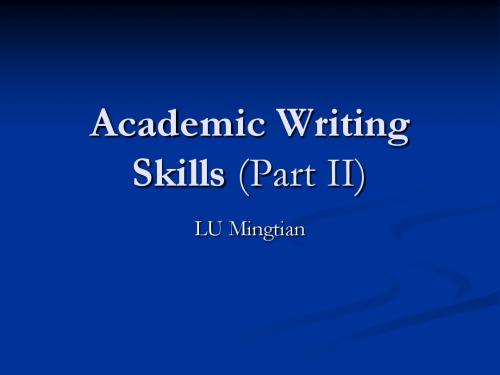
Things that you should not do
Colloquialisms: don’ I’ they’ Colloquialisms: don’t, I’lore English, Chinglish, and other hundreds of dialects; Slang: British slang—”bad” means slang— bad” good
First 2-3 words of the work title, no article 2The book College Bound Senior (1979) …study finds (“On Free Care,” 1982 ) Care,”
Works from Electronic Sources
Other tips for academic writing
Check your paper using spelling checking in MS Word software. Ask and exchange your paper for proof-reading. proofSave your paper in at least two places (use your email box or web-storage service). webKeep a record for each of your revision paper.
Academic Writing Skills (Part II)
LU Mingtian
Formal vs. informal (common & colloquial )
ESP: academic writing: social science About 30 different academic styles, styles, infor from the Internet.
英语学术论文写作技巧academic writing skills(全英文版)
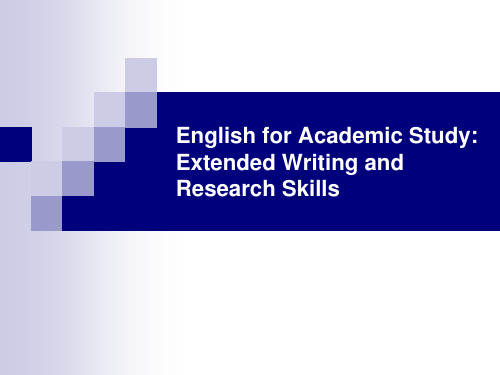
Introduction
Main body
Conclusion
1) 2)
3) 4) …
1) 2)
3) Developing a focus Steps in getting started:
Choosing a topic Brainstorming ideas Narrowing the focus by asking yourself questions Establishing a working title which is flexible and developmental Choosing some of your sources by looking at journals, books and websites
6)
Task 3: Starting Project
Work on this project by answering the following questions, which are grouped under the three broad headings Introduction, Main body and Conclusion. First read the questions.
Task 1: What do students write? Essay Extended essay or project Report Thesis Dissertation Case study
Whatever form of extended writing students are expected to do, the process will usually involve the following steps: - gathering information from various sources; - organizing this information so that it appropriately answers the needs of the task that the writer has to complete; - planning the text; - drafting and redrafting the text until it communicates the information and ideas fully and clearly.
academic writing skills
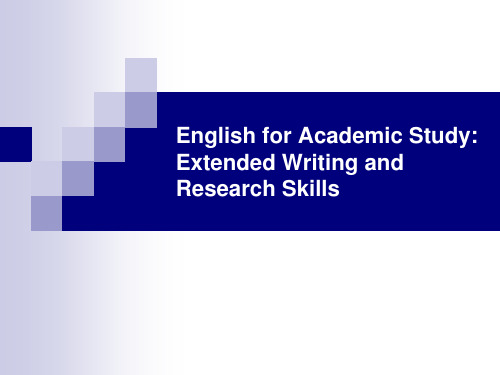
In the appropriate boxes below, brainstorm some ideas on the above questions. At the moment, you are only being asked to guess what the answers might be. After this, you will have to carry out the survey and do some reading to find out whether your guesses are correct or not. You will also be reading to find out other ideas about the topic. This reading stage is one of the most important parts of your work because you will be looking for evidence to support your ideas. Write your initial ideas in the boxes below. You only need to write in note form.
Planning 1)
2) 3) Think of working title for the project 4) 5)
Researching 1)
2) 3)Highlight/take notes of relevant information 4) 5)
Writing up 1)
2) 3) 4) 5) Write the contents page, bibliography, title page and abstract.
英语作文 技巧

英语作文技巧English Essay Writing Techniques。
Introduction。
Crafting an effective English essay is a skill that takes time and practice to develop. Whether you are a student writing for academic purposes or an aspiring writer seeking to hone your craft, mastering the art of essay writing can open up a world of opportunities. In this comprehensive guide, we will explore the key techniques and strategies that can help you elevate your English essay writing skills.Understanding the Essay Structure。
The foundation of a well-written essay is a solid structure. The traditional essay format typically consists of three main components: the introduction, the body, and the conclusion.The Introduction。
The introduction serves as the opening of your essay, setting the tone and providing the reader with a clear understanding of the topic. It should begin with a captivating hook, such as a thought-provoking question, a striking statement, or an interesting anecdote, to grab the reader's attention. The introduction should also provide some background information on the topic and clearly state the thesis statement, which is the central argument or main idea of the essay.The Body。
学术英语写作进阶教程
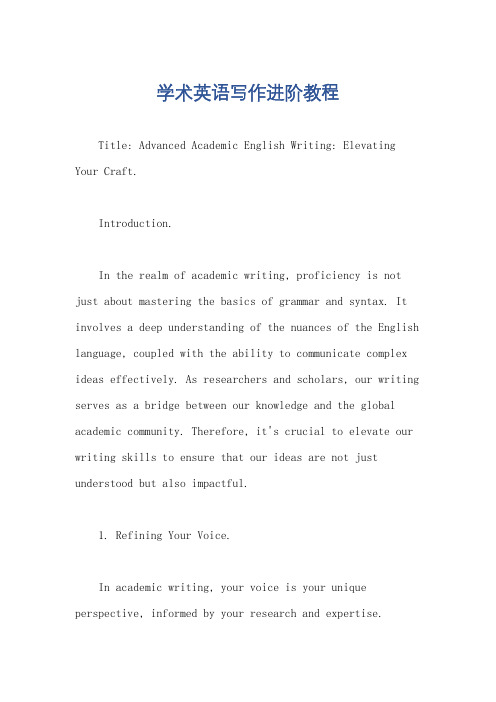
学术英语写作进阶教程Title: Advanced Academic English Writing: Elevating Your Craft.Introduction.In the realm of academic writing, proficiency is not just about mastering the basics of grammar and syntax. It involves a deep understanding of the nuances of the English language, coupled with the ability to communicate complex ideas effectively. As researchers and scholars, our writing serves as a bridge between our knowledge and the global academic community. Therefore, it's crucial to elevate our writing skills to ensure that our ideas are not just understood but also impactful.1. Refining Your Voice.In academic writing, your voice is your unique perspective, informed by your research and expertise.Developing a strong academic voice requires you to be confident in your knowledge and ideas. This confidence should translate into your writing, making it authoritative and engaging. Avoid sounding tentative or uncertain, asthis can undermine your credibility. Instead, present your ideas confidently and back them up with evidence and examples.2. Structuring Your Arguments.A well-structured argument is the backbone of any academic writing. It ensures that your ideas flow logically and are easy to follow. Begin by clearly defining yourtopic and research question. Then, outline the main points you want to make and organize them into a logical framework. Use headings and subheadings to break up your text and make it easier to scan. Finally, ensure that your conclusionties back to your introduction and leaves the reader with a clear understanding of your argument.3. Using Language Effectively.In academic writing, precision is key. Choose your words carefully to ensure that you convey your ideas accurately. Avoid using vague or ambiguous language, as it can lead to misinterpretation. Instead, use specific examples and illustrations to clarify your points. Additionally, vary your sentence structure and use active voice to keep your writing dynamic and engaging.4. Incorporating Critical Thinking.Critical thinking is an essential skill in academic writing. It involves analyzing and evaluating information, identifying weaknesses in arguments, and offering alternative perspectives. To incorporate critical thinking into your writing, challenge assumptions and conventional wisdom. Question the validity of sources and provide alternative interpretations. This not only makes your writing more robust but also adds to its credibility.5. Citing Sources Correctly.In academic writing, proper citation is crucial toavoid plagiarism and ensure the credibility of your work. Familiarize yourself with the citation styles used in your field, such as APA, MLA, or Chicago. Ensure that you correctly cite all sources used in your writing, including books, articles, websites, and interviews. Not only does this acknowledge the contributions of others but also helps build trust with your readers.6. Seeking Feedback.Writing is a craft that requires constant practice and refinement. Seeking feedback from peers, mentors, or professional editors can help you identify areas for improvement in your writing. Be open to criticism and useit constructively to enhance your writing skills. Additionally, reading widely and paying attention to the writing styles of others can inspire you and help you develop your own unique voice.Conclusion.Elevating your academic English writing skills is ajourney that requires dedication and practice. By refining your voice, structuring your arguments, using language effectively, incorporating critical thinking, citing sources correctly, and seeking feedback, you can transform your writing from good to great. Remember, every word you write is an opportunity to make a difference in the academic world. So, take the time to craft your ideas carefully and make the most of these opportunities.。
英文作文诀窍秘诀
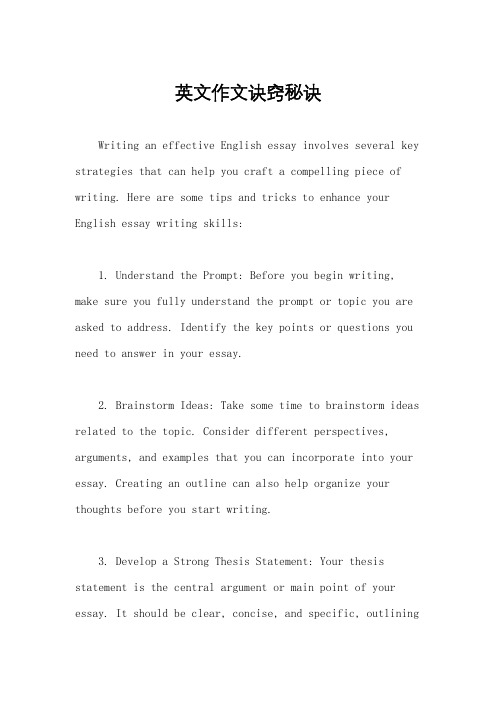
英文作文诀窍秘诀Writing an effective English essay involves several key strategies that can help you craft a compelling piece of writing. Here are some tips and tricks to enhance your English essay writing skills:1. Understand the Prompt: Before you begin writing, make sure you fully understand the prompt or topic you are asked to address. Identify the key points or questions you need to answer in your essay.2. Brainstorm Ideas: Take some time to brainstorm ideas related to the topic. Consider different perspectives, arguments, and examples that you can incorporate into your essay. Creating an outline can also help organize your thoughts before you start writing.3. Develop a Strong Thesis Statement: Your thesis statement is the central argument or main point of your essay. It should be clear, concise, and specific, outliningthe main idea you will be discussing in your essay.4. Use Clear and Concise Language: Aim to communicate your ideas clearly and concisely. Avoid using overly complex language or jargon that may confuse your readers. Use transition words and phrases to help guide your reader through your essay.5. Provide Evidence and Examples: Back up your arguments with evidence and examples to support your claims. This could include statistics, research findings, personal anecdotes, or examples from literature or history.6. Structure Your Essay Properly: A well-structured essay has a clear introduction, body paragraphs, and conclusion. The introduction should introduce your topicand thesis statement, the body paragraphs should present your arguments and evidence, and the conclusion should summarize your main points and restate your thesis.7. Revise and Edit: Once you have written your essay, take the time to revise and edit it. Check for grammar andspelling errors, as well as clarity and coherence. Consider seeking feedback from peers or teachers to improve your essay further.8. Practice Regularly: Like any skill, writing takes practice. Make a habit of writing regularly, whether it's through journaling, completing essay prompts, or participating in writing workshops. The more you practice, the more confident and skilled you will become as a writer.By following these tips and practicing regularly, you can improve your English essay writing skills and become a more effective communicator. Remember to stay focused, organized, and concise in your writing, and don't be afraid to seek feedback and make revisions to improve your work.。
Life Skills - Writing - Academic Writing Skills

1
The Experience of Writing
Intense ambivalent experience Feeling of vulnerability, enthusiasm and satisfaction Very seldom spoken about Perceptions of how intelligent you are We only see the ‘best’ Public and private experience
Topic area:
The role of nutrition in the prevention of infection
Main Component Protein Main Component Vitamins
Main Component Minerals
C O N C L U S I O N
The Experience of Writing
Writers Block
Causes: • Insisting on the prefect draft • Waiting for inspiration Useful Strategies: • Make notes • Brainstorming • Piecework • Satisficing
Academic Writing Skills
Phil Halligan
Lecturer in Nursing RCSI
Learning Outcomes
Following this session the student will be able to: • Develop confidence with writing assignments • Employ strategies for beginning and developing an assignment • Review and identify components of a title • Identify the key components of a good assignment • Identify ways of developing a style of writing
大学生作文写作英语技巧

大学生作文写作英语技巧Writing is an essential skill for university students, as it is a primary means of communicating ideas, expressing thoughts, and demonstrating knowledge. However, many students struggle with effectively conveying their message in English, a language that may not be their native tongue. Developing strong English writing techniques can significantly improve a student's academic performance and future career prospects. In this essay, we will explore several key strategies that university students can employ to enhance their English writing skills.One of the fundamental aspects of effective writing is organization. University-level essays and assignments often require a clear and logical structure, with a well-defined introduction, body, and conclusion. Students should familiarize themselves with common essay formats, such as the five-paragraph structure, and practice outlining their thoughts before beginning to write. This organizational approach helps to ensure that the ideas flow seamlessly and the overall argument or narrative is coherent.Another crucial element of English writing is the use of appropriate vocabulary. University-level writing typically demands a more sophisticated and academic lexicon compared to casual conversation or informal writing. Students should strive to expand their vocabulary by reading extensively in their field of study, utilizing online resources and dictionaries, and actively incorporating new words into their writing. Additionally, they should be mindful of word choice and aim to select terms that accurately convey their intended meaning.Sentence structure and grammar also play a significant role in the quality of English writing. University students should develop a strong understanding of English grammar rules, including subject-verb agreement, tense consistency, and proper use of punctuation. Practicing various sentence structures, such as simple, compound, and complex sentences, can help students create more varied and sophisticated compositions. Regularly reviewing and editing their work can also help students identify and correct grammatical errors.Effective use of transitions is another important aspect of English writing for university students. Transitions are words or phrases that connect ideas and guide the reader through the flow of the text. Utilizing appropriate transitions, such as "in addition," "furthermore," or "on the other hand," can help students create a cohesive and logical argument or narrative. Mastering the use of transitions cansignificantly improve the overall clarity and coherence of a written piece.In addition to the technical aspects of writing, university students should also focus on developing their critical thinking and analytical skills. Effective English writing often requires the ability to analyze complex topics, synthesize information from various sources, and present a well-reasoned argument or perspective. Students should practice identifying and evaluating the strengths and weaknesses of their own writing, as well as the writing of others, to continuously improve their critical thinking and writing abilities.Another important consideration for university students is the need to adhere to academic writing conventions and citation styles. Depending on the discipline, students may be required to follow specific formatting guidelines, such as those outlined by the American Psychological Association (APA) or the Modern Language Association (MLA). Familiarizing themselves with these conventions and consistently applying them can help students avoid plagiarism and demonstrate their ability to engage with and acknowledge the work of others.Finally, university students should not underestimate the value of practice and feedback in improving their English writing skills. Writing is a skill that can be developed and refined throughconsistent practice and exposure to constructive feedback. Students should seek opportunities to write regularly, whether through class assignments, extracurricular activities, or personal writing projects. Additionally, they should be open to receiving and incorporating feedback from instructors, peers, or writing centers to identify areas for improvement and continuously enhance their writing abilities.In conclusion, developing effective English writing techniques is a crucial skill for university students. By focusing on organization, vocabulary, grammar, transitions, critical thinking, academic conventions, and consistent practice, students can significantly improve their ability to communicate their ideas effectively in written form. These skills not only enhance academic performance but also prepare students for the demands of the professional world, where clear and compelling written communication is highly valued.。
通用学术英语(技能篇)

通用学术英语(技能篇)IntroductionAcademic English writing is a significant part of the academic career of every student worldwide. However, mastering academic English writing requires sufficient knowledge and skills. Being proficient in academic English writing is necessary for students who want to succeed in their studies and their future careers.In this article, we will discuss the essential skills required for academic English writing. These skills include understanding the writing process, critical thinking, coherence, and citation.Understanding the Writing ProcessAcademic writing is a process that involves several steps that must be followed to produce a successful paper. The writing process includes researching, planning, drafting, revising, and editing. Before starting to write, it is essential to research on the topic to collect sufficient information. This information should not be taken from only one source, but different sources to have a well-rounded understanding of a topic.After researching, planning will follow. The main purpose of outlining a plan is to have a clear idea of the goal of the paper and an overview of the structure of the paper before writing.When drafting, the writer should aim to give meaning to the research collected and express it in written form. After drafting, thepaper should be revised to make sure that it flows logically, the content aligns with the thesis statement, and the arguments presented are credible.The final stage of the writing process is editing. It entails checking the grammar, punctuation, and spelling. Proofreading will prevent common errors from occurring in the final draft which otherwise would adversely affect the paper.Critical ThinkingCritical thinking is a crucial skill in academic English writing. It describes the examination of facts and opinions before forming an opinion or conclusion. Critical thinking helps writers understand a topic better and express themselves more accurately.To develop critical thinking skills, the writer needs to question the purpose, context, and claim of the information they are reading. Critical thinking also means analyzing if the source of information is credible, as this helps to differentiate between credible and non-credible sources of information.CoherenceCoherence refers to the ability of a text to be easily understood. The writer must ensure that each paragraph of a paper flows smoothly to ensure continuity. Coherence is achieved by using transitions where suitable. Transitions are words or phrases that link two paragraphs by indicating a connection between the two and show the direction that ideas are being taken.Using citationsCitations are essential in academic writing as they show the source of the information presented. Citations boost the credibility of the paper and support its arguments with solid evidence.When citing, it is advisable to use styles such as APA, MLA, and Chicago as these are widely recognized across various scholarly disciplines. To ensure that the paper adheres to the required citation style, it is essential to seek guidance from the professor or review the style guide for the required citation style. It is also crucial to place the citations correctly, either as in-text citations or in a reference list.ConclusionMastering academic English writing is critical in pursuing an academic career. The skills discussed in this article- understanding the writing process, critical thinking, coherence, and citation-are vital in achieving the desired academic success. By adhering to these skills, a student can produce a well-organized, coherent, and credible paper in any given academic discipline.In addition to the skills mentioned above, there are other skills that are equally important for academic English writing.One such skill is the ability to write in an appropriate academic tone. Academic writing should always be formal, objective, and free of emotional bias. The use of contractions and colloquial language should be avoided at all costs, as these can lead to a lackof clarity and undermine the credibility of the writer.Another essential skill is the ability to organize the material in a logical and coherent manner. This means that the ideas presented in the paper should flow logically and smoothly, and each paragraph should be linked in a meaningful and well-structured way. This can be achieved by using topic sentences and supporting evidence to establish the main point of each paragraph and ensure that the reader can follow the argument easily.Moreover, academic writing requires a high level of accuracy and attention to detail. The writer should ensure that all facts, ideas and arguments are supported by accurate and reliable evidence, and that any errors in spelling, punctuation and grammar are corrected. This not only ensures that the paper is credible and authoritative, but also makes it more readable and engaging for the reader.Another important aspect of academic writing is the ability to use suitable vocabulary and language appropriate to the level of the reader. This means that the writer should avoid using overly complex language or technical terms that the reader may not understand, but at the same time, should use words and phrases that suggest a sophisticated and knowledgeable approach to the subject matter.Finally, it is essential to develop good time management skills in order to produce high-quality academic writing. This means setting aside enough time to complete the research, writing, revision and editing process, and ensuring that all deadlines are met. Developing a system of prioritizing tasks and breaking largerprojects into smaller, more manageable tasks can be helpful in achieving this.In summary, academic English writing requires a wide range of skills, including those related to the writing process, critical thinking, coherence, citation, appropriate tonality, logical structure, accuracy, good vocabulary and language use, and time management. Mastering these skills is essential for success in the academic world, and can also be applied to other areas of life, where clear, concise and authoritative communication is required. So, it is important for students to develop these skills from the beginning of their academic career to excel in the long run.。
- 1、下载文档前请自行甄别文档内容的完整性,平台不提供额外的编辑、内容补充、找答案等附加服务。
- 2、"仅部分预览"的文档,不可在线预览部分如存在完整性等问题,可反馈申请退款(可完整预览的文档不适用该条件!)。
- 3、如文档侵犯您的权益,请联系客服反馈,我们会尽快为您处理(人工客服工作时间:9:00-18:30)。
Planning 1)
2) 3) Think of working title for the project 4) 5)
Researching 1)
2) 3)Highlight/take notes of relevant information 4) 5)
Writing up 1)
2) 3) 4) 5) Write the contents page, bibliography, title page and abstract.
Introduction
What are the problems we are now facing in terms of environmental protection/copyright protection? (Background information) What is college students’ awareness of environmental protection/copyright protection? (Background information) What do you think should be done to develop college students’ awareness? [You opinion on this question will help form your “thesis” --- that is the main argument you will present in your project.]
Conclusion
Based on the evidence you have presented above, what effective measures should be taken to raise college students’ awareness of environmental protection/copyright protection? Does the evidence you put together in the “main body” support the thesis you introduced in your introduction?
a) Read the first draft. b) Edit the draft --- decide objectively whether your ideas have been expressed clearly. c) Think of a working title for the project. d) Search for relevant journals/books/information in the library and on the Internet. e) Write down the details of your sources. f) Decide if you need to do more reading. g) Write the contents page, bibliography, title page and abstract. h) Arrange a tutorial with your tutor. i) Do some reading. j) Decide on a topic. k) Write the first complete draft. l) Highlight/take notes of relevant information. m) Plan the contents in detail. n) Work on establishing a clear focus. o) Make a rough outline plan of your ideas. p) Check that sources are available/accessible.
In the appropriate boxes below, brainstorm some ideas on the above questions. At the moment, you are only being asked to guess what the answers might be. After this, you will have to carry out the survey and do some reading to find out whether your guesses are correct or not. You will also be reading to find out other ideas about the topic. This reading stage is one of the most important parts of your work because you will be looking for evidence to support your ideas. Write your initial ideas in the boxes below. You only need to write in note form.
Task 2: Analysing the task
Before beginning any task, it is important to analyse the requirements of the task so that you have a very clear idea of your purpose for writing. Consider the following project title: “A survey on college students’ awareness of environmental protection/copyright protection” Discuss the following with a partner: Look at the project title above and highlight the key words/phrases. How is the title framed (e.g. statement/question/heading)? What does the title ask you to do?
Main body
What specific problems are related to college students’ lack of awareness of environmental protection/copyright protection? What evidence can you find for this? What are the possible reasons for the existing phenomena? What evidence can you find for this? What are the possible solutions to the problems outlined above? What evidence can you find to support your suggestions?
Task 3: The stages of writing a project
There are three stages in producing an extended essay or project: planning, researching and writing up. In each of these stages there are a number of smaller steps. Put the steps listed below into the appropriate stages (Planning, Researching or Writing up), in the most appropriate order. Write the steps in full; do not write numbers. Note that one step can placed in two stages.
6)
Task 3: Starting Project
Work on this project by answering the following questions, which are grouped under the three broad headings Introduction, Main body and Conclusion. First read the questions.
Extended writing at university: Why do students write?
The reasons why students carry out extended academic writing activities may include: to develop and express their ideas; to provide evidence to support their ideas; to dispute or support existing theories; to display knowledge.
Introduction
Main body
Conclusion
1) 2)
3) 4) …
1) 2)
3) 4) …
1) 2)
3) 4) …
Session 2: Developing a focus Steps in getting started:
Choosing a topic Brainstorming ideas Narrowing the focus by asking yourself questions Establishing a working title which is flexible and developmental Choosing some of your sources by looking at journals, books and websites
